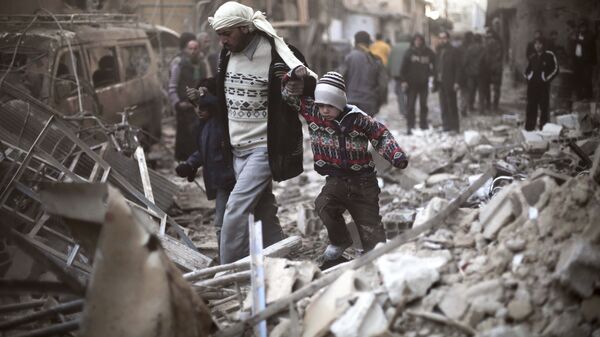The minister went on by expressing concern over the proposed UN Security Council resolution on Syria, saying that it may aim to accuse Damascus of everything and to protect the militants.
The top diplomatic official noted, however, that Russia was ready to consider the draft resolution.
"The resolution that we are suggested to adopt ..., we are ready to consider this proposal," Lavrov said, noting that at the same time the ceasefire regime "must not at all" reach the Daesh and the Jabhat al-Nusra terror groups (both banned in Russia) and those factions that are cooperating with them and systematically firing on the residential areas of Damascus.
The minister was commenting on the draft resolution, on the introduction of a 30-day ceasefire in Syria for the delivery of humanitarian aid and medical evacuation, proposed by the delegations of Sweden and Kuwait to the Security Council. The voting on the draft is expected to take place on Thursday.
READ MORE: UN Security Council to Meet Over Syria's East Ghouta on Thursday
As Lavrov further noted, the West doesn't seem to want to extract those terrorist forces from the ceasefire deal.
"Our western partners, unfortunately, do not want to go for such a clear withdrawal of terrorists from the ceasefire regime, this raises certain questions," the minister stressed.
He underlined that Russian military forces, working in Syria, particularly the Reconciliation Center, have offered the militants to peacefully leave the territory of Eastern Ghouta, similar to the evacuation of militants with their families from Eastern Aleppo.
"Moreover, a few days ago, our military, operating in Syria at the Reconciliation Center, offered militants to leave Eastern Ghouta peacefully, just like the militants who were evacuated with their families from Eastern Aleppo. Jabhat al-Nusra and those who interact with them, flatly refused this offer.
READ MORE: Countries Supporting Terrorism Responsible for Situation in E Ghouta - Kremlin
He reminded that Russia had called for the Thursday UN meeting.
"We offered to consider the situation in Eastern Ghouta and the situation around it. If our arguments are ignored yet again, we will have no other choice but to believe that the authors of this initiative yet again want to blame Damascus and protect terrorist groups," he said.
Eastern Ghouta is one of four Syrian de-escalation zones created during the Astana talks on Syrian reconciliation. Three states: Russia, Iran and Turkey serve as guarantors of the de-escalation deals, which apply to all sides except those linked to the al-Qaeda terrorist group (banned in Russia).
According to the UN, almost 400,000 people have been trapped in the area besieged by Syrian government forces, while Russia argues these claims, saying that Damascus has been attacked by militants controlling the enclave.
READ MORE: Kremlin: US Accusations Against Russia on Eastern Ghouta Groundless
Russia, US Relations, Energy Market
The Russian foreign minister went on to speak about US trade policies, saying that Washington was trying to push Moscow out of the Eurpean energy market, promoting their liquified natural gas (LNG).
"We know that a significant part of the anti-Russian approach in the Balkans and, in general, in Europe, is initiated by Washington. We see this aim very clearly. The goal is stake out American military-political domination and economic leadership, including by trying to force Russia out of energy markets and force Europeans to switch to more expensive liquefied gas from the United States," Lavrov said at the University of Belgrade.
He specified that the Balkan countries' entrance into NATO, forcing them to take a side in the military-political confrontation, the philosophy which the US is promoting in Europe.
The minister concluded that it hardly had anything to do with the declared goal of strengthening the national security of the Balkan states, as "no one was threatening them."




